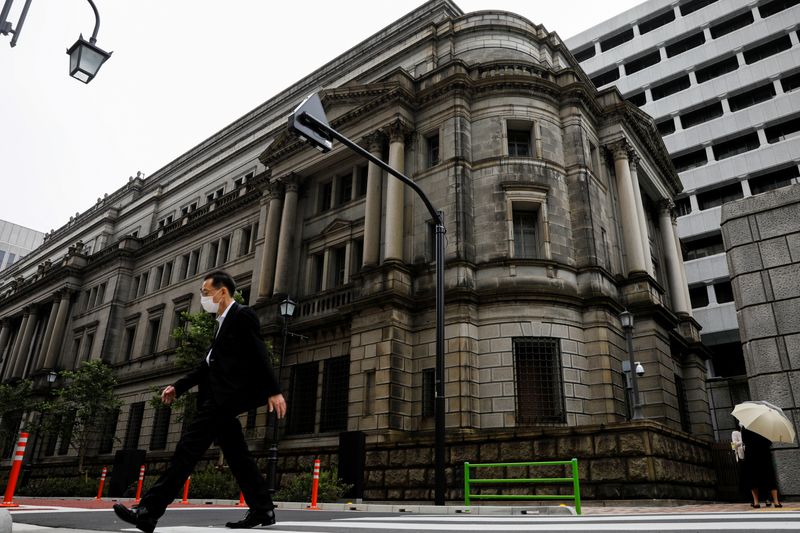
FILE PHOTO: A man wearing a protective mask walks past the headquarters of Bank of Japan amid the coronavirus disease (COVID-19) outbreak in Tokyo, Japan, May 22, 2020.REUTERS/Kim Kyung-Hoon/File Photo
November 17, 2021
By Leika Kihara and Takahiko Wada
TOKYO (Reuters) – A Bank of Japan scheme introduced to support smaller lenders hurt by its ultra-low interest rates has perversely pushed up short-term borrowing costs, further complicating the central bank’s plans to eventually ditch easy monetary policy.
Years of ultra-low rates have squeezed profits of regional lenders and stoked fears of a banking crisis, forcing the BOJ to launch in March a programme that pays 0.1% interest on deposits parked by regional banks that consolidate or cut costs.
That prompted smaller banks to aggressively tap funds from the money market to shift into BOJ accounts, pushing up the benchmark rate close to 0% in defiance of the central bank’s policy to guide short-term rates around -0.1%.
In an unprecedented move, the BOJ decided on Tuesday to tweak rules of the reward scheme just eight months after its introduction.
While the response partly addresses immediate concerns over rising rates, it also shows how the BOJ’s complicated policy framework has become an unwieldy balancing act.
“The BOJ has introduced various schemes in recent years that contradict its negative rate policy, which penalises banks for holding onto cash,” said Naomi Muguruma, senior market economist at Mitsubishi UFJ Morgan Stanley Securities.
“As a result, the core of the BOJ’s monetary policy seems to be wavering. The central bank must decide what it’s going to prioritise.”
The average overnight call rate – Japan’s key money market rate – crept up to hit -0.006% on Sept. 9, the closest it has been to positive territory since 2016.
It came close again last month, when it hit -0.008%. The outstanding balance regional banks borrowed from the uncollateralised call market exceeded 11 trillion yen ($97 billion) as of end-October, nearly double the level in January.
GRAPHICS: Japan’s overnight call rate moves since YCC https://graphics.reuters.com/JAPAN-ECONOMY/BOJ/gdvzydbgrpw/chart.png
While the immediate impact on the economy is small, a rise above 0% would cast doubt on the BOJ’s control over rates and the credibility of its yield curve control (YCC) policy.
“If the overnight call rate turns positive, it would be a denial of the BOJ’s policy,” said a fund manager at a regional bank, who spoke on condition of anonymity.
Some BOJ policymakers have voiced concern.
“We need to watch carefully whether there is no disruption in market operations,” one board member told a policy meeting in September, according to a minutes of the discussion.
GRAPHIC: Japan’s regional banks outstanding balance in call money market
has risen https://graphics.reuters.com/JAPAN-ECONOMY/BOJ/byvrjkenkve/chart.png
The BOJ’s move on Tuesday to limit the payouts to regional lenders using its relief scheme underscores how the central bank’s delicate balancing act to meet two goals – forcefully cap rates without hurting bank profits – is wobbling.
While the BOJ took steps in March to make YCC sustainable, the recent unintended rise in short-term rates also raises questions over whether the policy can endure as other central banks ponder rate hikes.
“By offering subsidies to regional banks, the BOJ is effectively phasing out its unpopular negative rate policy,” said former BOJ board member Takahide Kiuchi.
“It would be far easier if the BOJ abandoned negative rates. But it can’t as doing so could trigger an unwanted yen rise.”
For now, money market rates have stabilised as banks pay heed to warnings by BOJ officials to avoid tapping money market funds at positive rates.
But there is uncertainty on how long the calm will last.
“No bank would dare challenge the BOJ” by tapping funds at positive rates, even though doing so makes economic sense, another regional bank fund manager said. “But if the call rate does turn positive for some reason, that could change.”
($1 = 114.8800 yen)
(Reporting by Leika Kihara and Takahiko Wada, Additional reporting by Daniel Leussink; Editing by Sam Holmes)

